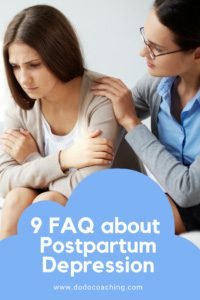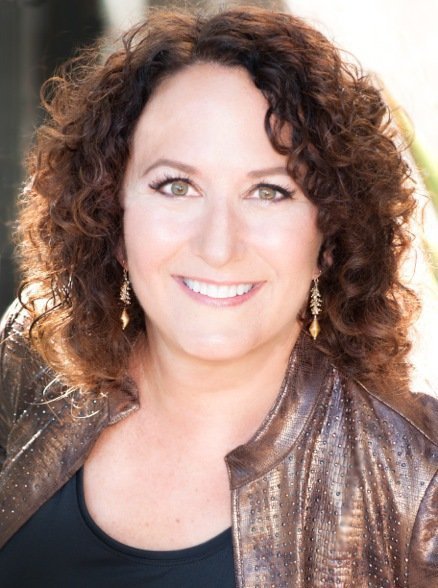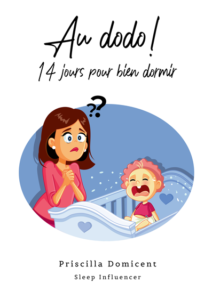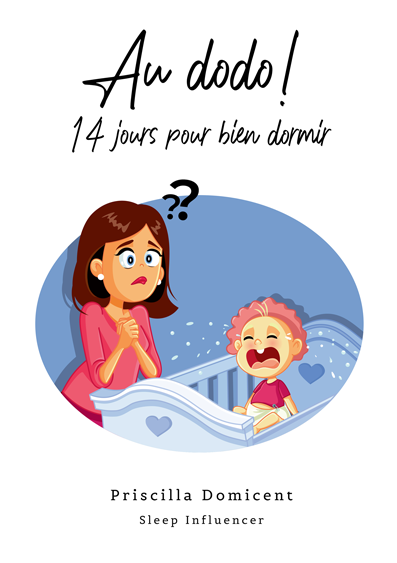Dr. Shoshana Bennett (a.k.a. Dr. Shosh) is a survivor of two life-threatening postpartum depressions. After experiencing these postpartum depressions, she emerged from her personal nightmare to become a leading national advocate and pioneer in women’s mental health, establishing Postpartum Assistance for Mothers, which offers education and emotional support for women experiencing postpartum depression and related disorders.
I had the great pleasure to listen to Dr. Shosh’s lecture while being trained to become a Gentle Sleep Coach®. In my opinion, her knowledge and expertise about postpartum depression have to be shared with a larger audience.
Below is my interview with Dr. Shosh that addresses the basic and most common questions about postpartum depression, amongst other topics, to the symptoms and treatment.
Q: How do you know if you have postpartum depression or the very normal baby blues?
Dr. Shosh: There are two ways that you can differentiate baby blues (part of normal adjustment) from the disorder of postpartum depression. The first one is by how long the symptoms last. Baby blues should be gone by about 2 weeks following the delivery or whenever the baby joins your home in the case of an adoption. If the symptoms continue past 2 weeks, we then call it postpartum depression, even if they are very mild. At that point, the mother should be evaluated and assessed, just in case she needs some extra intervention other than the regular support that all mothers need. So, the length of time is one way to tell the difference.
The second way you tell the difference is by the severity of the symptoms. Right upon delivery, the symptoms can, for instance, be fear, anxiety, sadness, numbness, low self-esteem, crying, anger, loss of appetite, insomnia, and inability or difficulty to sleep even when she has the chance to sleep at nighttime. If these types of symptoms are apparent and get in the way of her daily functioning or her ability to sleep at nighttime when her baby is sleeping, she should not wait. Even if these appear during the first 2 weeks postpartum, she should get help right away. So, there are the 2 main ways you differentiate the disorder of postpartum depression from the normal baby blues: the length of time that the symptoms continue and by the severity of the symptoms. If either one is occurring, you should get in touch with a perinatal specialist such as a psychotherapist who specializes in perinatal mood and anxiety disorders or another healthcare practitioner you trust.
Q: How many mothers get affected by postpartum depression?
Dr. Shosh: Around 1 in 7 (about 15%) of new mothers experience something greater or more severe than the very normal baby blues. Postpartum depression is the most common complication of childbearing.
Q: Can fathers also go through postpartum depression?
Dr. Shosh: Yes, absolutely. This will not occur due to the reproductive hormones shifting, of course, but there are many different factors that can bring on a postpartum reaction. A mental health issue, stress, sleep deprivation can cause it or make it worse. Dads experience postpartum depression at about a rate of 10% but if his partner also suffers from postpartum depression, that is the largest predictor of whether the father will have postpartum depression. If the mom is suffering postpartum depression, this rate goes up from between 24% and 50% for fatherhood depression. However, it is also possible that he is affected and the mother is not. During these last 3 decades, I have been called by moms who were doing perfectly fine but were worried about their partners.
Q: Can a parent’s postpartum depression affect the baby?
Dr. Shosh: The answer is most definitively: “Yes, it can!”. It is one of the main reasons that you want to jump on treating postpartum depression or anxiety as quickly as possible because it can affect every single relationship within that family unit. Children, particularly young children, are extremely vulnerable to the negative consequences of a parent’s depression. This is true especially when the primary caretaker, who is often but not always the mom, suffers from postpartum depression. The wisest and most loving step that the mom or the dad can take if he/she is depressed is to get help as fast as possible so that it does not interfere with the bonding and the quality of time spent with the child. Actually, pregnancy depression can also affect the growing baby but most definitely, postpartum depression can affect a young child. If it goes untreated, it can increase behavioral and neurological problems, developmental issues and increase the chances, by quite a large margin, that the child will also develop depression later on. Children are very typically resilient. If the parent gets help as fast as possible, and especially if the child is around a non-depressed caregiver, chances are that he will be absolutely fine. However, you do not want to take the risk; mom deserves to be happy, dad deserves to be happy and you want to do it for yourselves and also for the child(ren).
Q: What is your recommended treatment plan?
Dr. Shosh: I developed the Dr. Shosh Wellness Strategy. It includes getting rid of the myths of motherhood such as “My needs do not matter anymore” and very good communication within the couple or between the mom and her closest support. She also needs good physical activity as long as she is allowed to exercise. There is always some kind of activity that she can do to oxygenate her brain, which is good for her physically and also protects her mental health. In addition, she needs excellent nutrition and there are specific supplements that I recommend, as long as her doctor gives her the green light. These can help to prevent postpartum depression, not just help to treat it. Eating in particular ways like nibbling throughout the day the right kinds of foods (I go over these with my clients) as well as staying hydrated, and getting the right kind of support, both physical and emotional support can prevent, or at least minimize postpartum depression. If the person is already suffering, she needs to be working with a perinatal specialist. She should not just settle for somebody within her insurance company. It is very important not to waste time with a general therapist. She needs a specialist who has been properly trained with the right clinical expertise.
Q: Can the symptoms of postpartum depression disappear with time without any external help?
Dr. Shosh: The general answer to that is: “Yes, it can!”. However, one can never count on it going away by itself. You should jump on it and treat it as fast as you can. Treatment is not necessarily medication. Good therapy and a wellness plan can often be enough for the woman to be off and running and enjoying her new life. When you wait, just trying to tough it out and hoping it disappears on its own, sometimes it does go away and sometimes it doesn’t for a couple of years. In the meantime, all kinds of problems that could have been avoided have been arising in the home. There are absolutely zero benefits to just hoping that it will go away on its own without applying a good wellness strategy to help it disappear as quickly as possible.
Q: Does breastfeeding prevent postpartum depression?
Dr. Shosh: No, you can’t count on breastfeeding to prevent postpartum depression. There are hundreds and hundreds of angry women who have called me over the years. They were upset because they had been promised by either a professional or people in their environment that they would avoid postpartum depression if they breastfed their child. They call me and ask me: “What happened? I did everything right and I still got depressed!”. Of course, you can become depressed whether you are using formula, using your breast milk (by pumping or breastfeeding). What is most important is that you are feeding your child the way you truly want to be feeding your child. It will also depend if your body will allow you to if you choose to breastfeed. However, depression can happen no matter how you are feeding. So, don’t set yourself up thinking the following: “If I breastfeed, I definitively prevent postpartum depression.” It can happen in any case. When it comes to weaning, there is a good way to do it in order to protect your brain chemistry. When you get treated for postpartum depression, there is no reason why you would have to stop breastfeeding. You should be able to continue, even if you are taking medication. That is why it is so important to work with healthcare practitioners who know what they are doing. They know what is safe for the baby and what is not. Many women who are depressed and breastfeeding are afraid to get help because they think that if they need medication, they will have to stop breastfeeding. That is not the case with anti-depressants. Finding the people that have the right expertise to help is so important.
Q: Would you recommend that a mother takes anti-depressants during pregnancy or if she is breastfeeding?
Dr. Shosh: Besides what I mentioned earlier, what is very important and what I recommend, is to get a wellness strategy that suits you. There is no cookie-cutter approach. Every woman that is affected needs her very own individualized wellness plan. If she truly needs medication in order to recover, function well, enjoy and bond with her baby, then I would recommend that she does whatever she needs to do in order to be happy and healthy. Remember that if she does not, it can affect the entire family, including the newborn. Thus, it is important for the whole family unit that she gets the help she needs. If that includes medication, that is fine. The same is true with pregnancy. The psychiatrists I work the closest with will say that they do know enough at this point. Therefore, if a pregnant woman is clinically depressed (there are just as many as postpartum depressed moms, i.e. 15%) and needs to feel better, she needs to do what is necessary so that her family, including the baby, will not suffer from the negative consequences. If she needs to be treated during the pregnancy, she should follow those recommendations. Often, medication is not even needed during pregnancy. I did write “Pregnant on Prozac” in order to provide proper and truthful information. In this book, you can have a look at the resources you can trust and the ones you can throw out such as the ridiculous commercials on television that scare everybody. Basically, the mommy-to-be should do whatever is needed for her to be well and that is best for her whole family. Many of my clients end up not needing medication or they are able to wean off with some really good therapy and the wellness strategy I spoke of earlier in the interview.
Q: Does postpartum depression return automatically when expecting or after having given birth to the second child?
Dr. Shosh: If you have had symptoms of postpartum depression after any birth and if you do not have a wellness strategy in place, you are at very high risk to have another postpartum depression after a subsequent delivery. That is a big “IF” because if you are working with me, you are going to have a plan of action. I have been doing this for about 30 years and have worked with women having numerous more other children. In fact, they avoided postpartum depression entirely because they had an excellent wellness plan in place during pregnancy and have worked with women who have had more children after postpartum depression and they feel great. They knew who was going to prepare the meals, how she was going to get some good nighttime sleep, and so on. So, it does not return automatically when you have another child. You are at very high risk unless you have a plan for prevention. In a couple of my books, like “Postpartum depression for Dummies”, there is an entire chapter on prevention. If you suffered after one of your children was born, you can read the plan in order to know how to get it set up for yourself so that you don’t go through the same situation another time. No matter what, there is nothing to be worried about as long as you get the proper help.
If you think that you or a loved one is experiencing postpartum depression, don’t wait and expect that it will get better. Should you have any questions for Dr. Shosh, you can contact her directly through her website, Facebook or Twitter.
If you would like to get more information on how to improve the quality and the quantity of your child’s sleep, schedule your first free consultation now! It is a free and non-binding offer.


 Dr. Shosh helped develop the official training curriculum for professionals and served as President of Postpartum Support International. She is also an Executive Producer of the new award-winning documentary, Dark Side of The Full Moon. She is the author of Postpartum Depression for Dummies, Pregnant on Prozac, Children of The Depressed, and is co-author of Beyond the Blues: Understanding and Treating Prenatal and Postpartum Depression & Anxiety. Dr. Shosh is the creator of the first PPD mobile phone app PPD Gone! She co-founded the newly launched Postpartum Action Institute to train community leaders and parent advocates. Bennett has traveled extensively throughout the US and internationally as a guest lecturer and keynote speaker, training medical and healthcare professionals. She is well known for her popular Dr.Shosh.com Radio Show and has appeared as a guest expert on countless television and radio shows including 20/20, Ricki Lake and The Doctors. All aspects of the media consult, interview, and quote her regularly, including CNN, The Wall Street Journal, WebMD, NPR, Psychology Today, USA Today, Parenting, The Huffington Post, and Cosmopolitan. She has received numerous awards acknowledging and honoring her outstanding contributions and work as a women’s mental health advocate. Early in her career she served as a special education teacher, working with autistic and other learning-challenged children. She later taught early childhood education, psychology and special education for several California colleges. She earned three teaching credentials, two masters degrees, a Ph.D., and her license as a clinical psychologist. Today, she has helped more than 20,000 women worldwide through individual consultations, support groups, group workshops, and seminars. Maternal mental health is her life’s mission. She provides hope with compassion, personal experience, and the application of sound knowledge and research. Dr. Shosh helps her clients and colleagues understand that these disorders are completely treatable. With proper help, women can emerge from the crisis of these illnesses in charge of their health, making the best possible decisions for themselves and their families, and happier than ever before.
Dr. Shosh helped develop the official training curriculum for professionals and served as President of Postpartum Support International. She is also an Executive Producer of the new award-winning documentary, Dark Side of The Full Moon. She is the author of Postpartum Depression for Dummies, Pregnant on Prozac, Children of The Depressed, and is co-author of Beyond the Blues: Understanding and Treating Prenatal and Postpartum Depression & Anxiety. Dr. Shosh is the creator of the first PPD mobile phone app PPD Gone! She co-founded the newly launched Postpartum Action Institute to train community leaders and parent advocates. Bennett has traveled extensively throughout the US and internationally as a guest lecturer and keynote speaker, training medical and healthcare professionals. She is well known for her popular Dr.Shosh.com Radio Show and has appeared as a guest expert on countless television and radio shows including 20/20, Ricki Lake and The Doctors. All aspects of the media consult, interview, and quote her regularly, including CNN, The Wall Street Journal, WebMD, NPR, Psychology Today, USA Today, Parenting, The Huffington Post, and Cosmopolitan. She has received numerous awards acknowledging and honoring her outstanding contributions and work as a women’s mental health advocate. Early in her career she served as a special education teacher, working with autistic and other learning-challenged children. She later taught early childhood education, psychology and special education for several California colleges. She earned three teaching credentials, two masters degrees, a Ph.D., and her license as a clinical psychologist. Today, she has helped more than 20,000 women worldwide through individual consultations, support groups, group workshops, and seminars. Maternal mental health is her life’s mission. She provides hope with compassion, personal experience, and the application of sound knowledge and research. Dr. Shosh helps her clients and colleagues understand that these disorders are completely treatable. With proper help, women can emerge from the crisis of these illnesses in charge of their health, making the best possible decisions for themselves and their families, and happier than ever before.








Hi Dodo Coaching℠,
I saw you tweeting about depression and I thought I’d check out your website. I really like it. Looks like Dodo Coaching℠ has come a long way!
keep up the good work!
Cheers!
http://linkshrink.net/7soeFN
Hi Jerom,
Thank you so much for your words of encouragement. They mean a lot!